I was forty-nine when the silence in my house became unbearable. The hum of the fridge, the ticking clock, even the echo of my own footsteps felt deafening. I’d turn on the TV just to cover it up, but no noise could fill the emptiness that had crept into every corner. One afternoon, standing at the kitchen sink, I cried — not for anything in particular, just because there was nothing else to cry about.
Fifteen years earlier, my husband Oscar had left with a suitcase and the tired excuse of needing to “find himself.” He found someone else instead. I was left with two kids, a mortgage, and a nursing schedule that left no room for rest. I survived on caffeine and duty, holding everything together because there was no one else.
Now the kids were grown — one in Boston, the other in Oregon — and their empty rooms stared at me like ghosts. I caught myself setting three plates at dinner, then quietly put two away. That’s when I began volunteering at the soup kitchen downtown. Not out of charity or religion — I just needed to feel needed again.
The soup kitchen was cold, smelled faintly of bleach and old coffee, with flickering fluorescent lights, chipped mugs, and wobbly chairs. But it was alive, full of motion and people — some tired, some bitter, some kind — all trying. I respected that.
That’s where I met Rachel. She came every Saturday in a gray coat and scarf, hair tucked neatly. She didn’t ask for extra food, just quietly requested, “One for me, and one for someone who can’t come inside.” Her voice was calm, firm, and she never begged.
The rules were strict — one plate per person. Frank, the director, always reminded us. But I found myself slipping her a second plate. Her eyes met mine with quiet gratitude. “Thank you,” she’d whisper, and vanish. I never asked who she was feeding; maybe I didn’t want to know.
One Saturday, Frank arrived unexpectedly, furious. “I saw her,” he snapped, “feeding a dog out there. We can barely feed people, let alone animals.”
The room froze. My hand hovered over the ladle. Rachel’s calm face showed a flicker of shame. “Frank,” I said softly, “she’s not taking advantage. It’s just one extra bowl.”
“Rules are rules, Anna. You both broke them. She’s done here.”
The ladle slipped. Rachel didn’t argue; she just turned and walked out. I dropped my apron and followed. Outside, the cold hit me. “Rachel!” I called. Near the alley, I asked, “Is it true? You’ve been feeding a dog?”
She nodded. “I can’t leave him hungry. I won’t.”
She led me to the dumpsters, where under a tattered blanket lay a small, emaciated dog. “His name’s Lorde,” she said. “Someone abandoned him. He’s all I have.”
Impulsively, I pulled out the envelope of cash I had withdrawn that morning — almost my entire paycheck — and pressed it into her hand. “Take it. Get a room. Feed him.”
Her hands trembled. “I can’t take this.”
“You can. You will.”
Tears fell quietly. I hugged her, and for the first time in years, my heart felt lighter.
Six months later, a cream envelope arrived in my mailbox. No return address, just my name in looping cursive. Inside was a letter and a photo from Rachel:
She wrote about how the money allowed her to buy food for Lorde, replace her ID and Social Security card, get a job, and finally rent a small room. Lorde was healthy, safe, with a shiny coat and red collar. The photo showed her smiling, holding him in a sunlit kitchen.
That Saturday, I visited her. Her hair was shiny, her face clear, eyes bright. “Anna?” she said, hugging me before I could speak. Lorde barked happily.
Her tiny apartment smelled of stew. We sat, drank mugs of tea, and talked for hours. She shared her story: six miscarriages, a broken marriage, homelessness. “I didn’t think I was worth saving,” she admitted. “Then I found Lorde. And you gave me the chance to keep going.”
I took her hand. “You were never invisible, Rachel. Not to me.”
Lorde sighed in his sleep, tail thumping gently.
That night, when I returned to my quiet house, it no longer felt empty. It felt like something had finally come home.
